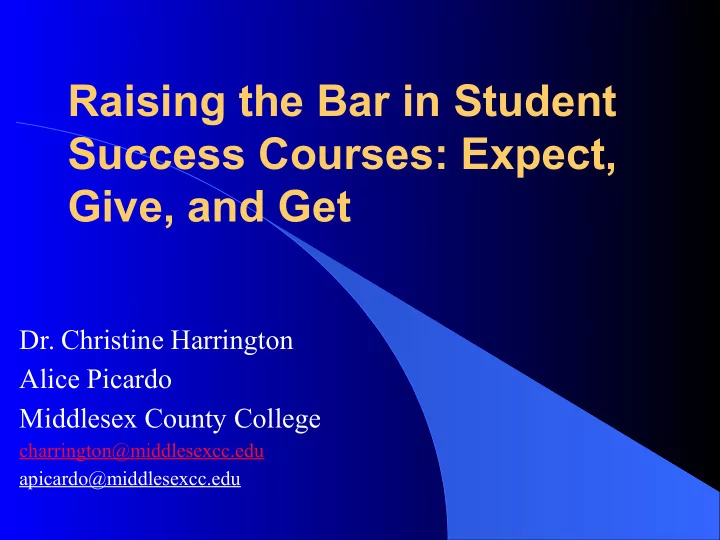

Raising the Bar in Student Success Courses: Expect, Give, and Get Dr. Christine Harrington Alice Picardo Middlesex County College charrington@middlesexcc.edu apicardo@middlesexcc.edu
EXPECT
SSD 101-Learning Outcomes 1. Discuss and apply study skills and student success research to daily practices as a college student. 2. Identify and critically evaluate information related to success in college. 3. Develop personally meaningful oral, visual, and written summaries of student success concepts. 4. Identify and engage in productive and ethical student behaviors. 5. Demonstrate effective interpersonal skills in groups and connections outside of the classroom.
Student Success Research • Credibility for students and campus • Beyond “advice” • Research based practice
QUESTION: SHOULD STUDENTS CHANGE THEIR ANSWER ON A TEST? 1. YES 2. NO
Di Milia, L. (2007). Benefitting from multiple- choice Exams: The positive impact of answer switching. Educational Psychology, 27(5), 607-615. Shatz, M.A., and Best, J. B. (1987). Students’ reasons for changing answers on objective tests. Teaching of Psychology, 14 (4), 241 -242.
Di Milia (2007) Judges reviewed changed answers for 2776 international students Wrong to Right Right to Wrong Wrong to Wrong 50% 25% 25% Note: Not many answers were changed (around 2%)
Shatz and Best (1987) 72% Wrong to Right if: Misread or Read something Misinterpreted the later that provided question a hint or clue Not worth the time if GUESSING!
Student Success Research: Doing What Works! Reading Information Literacy Critical Thinking
GIVE
Support • Believe in their Ability • Tasks within Reach: Breaking it down • Tutorials and Models
Dickinson, D.J., & O’Connell, D. Q. (1990). Effect of quality and quantity of study on student grades. Journal of Educational Research, 83 (4), 227- 231. • Does quantity or quality matter more?
Subjects 113 undergraduates taking a learning course (mostly juniors) 91 Females 22 Males
Method Trained in Studied and Operational Tracked Took Test Definitions Strategies Used 1.Reading 2.Reviewing 3.Organizing
ORGANIZING WAS THE ONLY VARIABLE THAT WAS LINKED TO GRADES!
More Results Average Number of High Performers Low Performers Minutes per Week M M (n = 20) (n = 19) Organizing * 43.13 10.28 Studying* 190.18 136.53 Reading 90.79 80.10 Reviewing 56.03 44.85 *p < .01
So What? Link Discover material to Find structure what you connections and know hierarchies
GET
Students: • High academic self-efficacy • Know what student success strategies work • Know value of peer reviewed research • Comfortable using databases and reading research
SSD 101 Data • Self-assessment • Multiple choice questions • Presentation Rubric • Focus groups
SSD 101 Data Multiple Choice Question Topic Percentage Correct Plagiarism 83 Evaluating websites 86 Optimal study environments 93 Combating test anxiety 93 Peer reviewed research 60 Needs work!
SSD 101 Data • Presentation Rubric : • Consistent scores of 3+ on 4 point scale • Self-assessment: • Ability to locate and identify components of research studies • General Course: 74% • Course with Research: 81%
HOW?
Zooming in on Research Worksheet Introduction: What question did the researcher seek to answer? Method: Who participated in the study? What did the researchers ask the participants to do? Results: What were the findings? Application: How can you use this information as a So What? student? What should we do with this information?
Are cell phone policies important? Does a ringing cell phone impact academic performance?
Investigating Cell Phone Ringing in a Classroom Setting End, Worthman, Mathews, and Wetterau (2010) 71 Students (23 Males; 48 Females) Watch Video and Take Notes Outcome Measures • Note Quality Cell Phone • Test Performance No rings for 5 Interruption seconds
Results Cell Phone Group: • Missed information • Performed worse on test items
Results Task No Cell Phone Cell Phone Correct Answers Item #1 94.9% 68.8% Item #2 79.5% 50.0% Important Information in Notes Item #1 79.5% 53.1% Item #2 82.1% 43.8%
Here’s the Plan: Teach the “elements” of research studies No Stakes- Read with Modeling Low to Moderate Stakes- Individual or Group Assignments In Class Peer Review and Support Feedback, Review and More Models
Reading, Critical Thinking and Information Literacy Reading • What do you do when you don’t know a word? • Taking notes while reading • Extracting key ideas and points
Reading, Critical Thinking and Information Literacy Critical Thinking • Can the results of the study apply to you? • How do you know the findings are accurate? • Look for additional evidence! • What else should the researchers investigate?
Reading, Critical Thinking and Information Literacy Information Literacy • How do you access information? • What type of information is available? • How do you evaluate whether the information is credible? • Where do you find scholarly sources like journal articles?
Work Collaboratively with Other Departments on Campus • Library • English • Communications
Questions? Contact Dr. Christine Harrington at charrington@middlesexcc.edu or Alice Picardo at apicardo@middlesexcc.edu THANK YOU: KEEP EXPECTING SUCCESS!
Recommend
More recommend